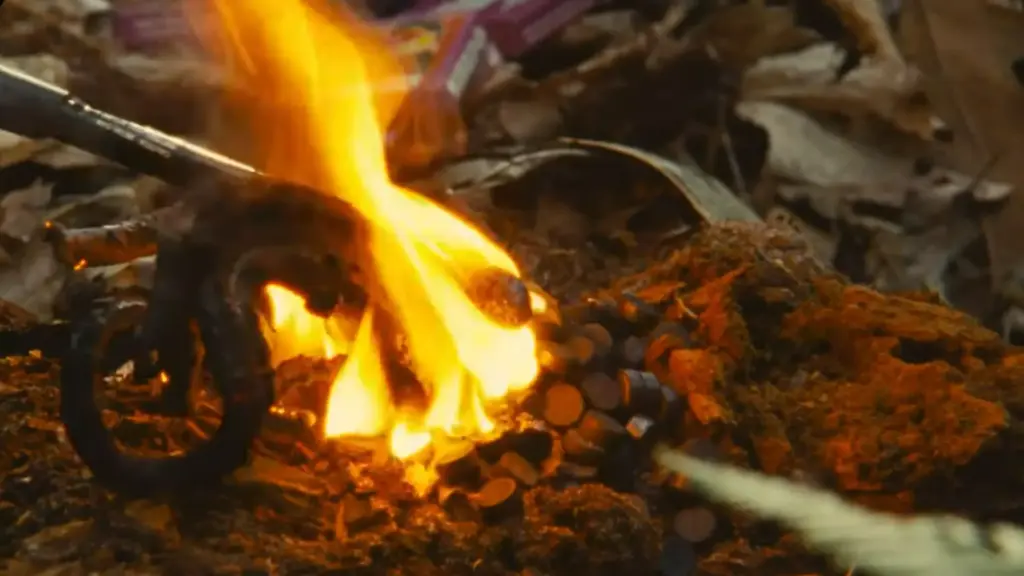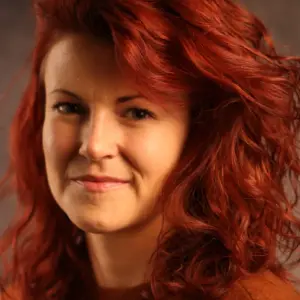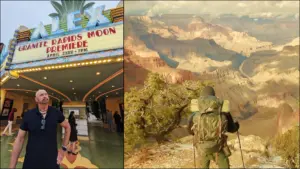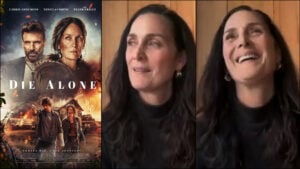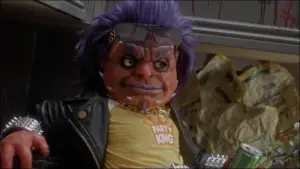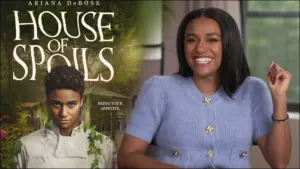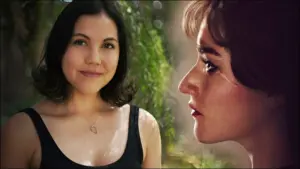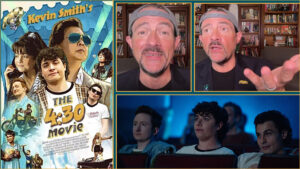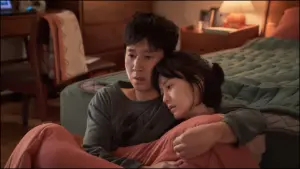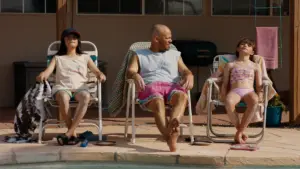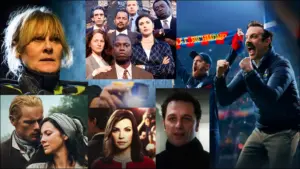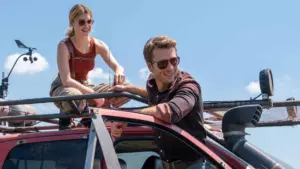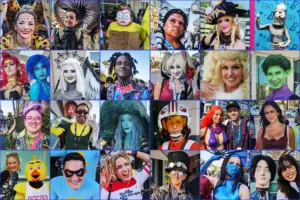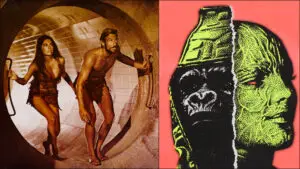Billed to audiences as his most heartfelt and personal project yet, but also his most haunting, filmmaker Joel Potrykus world premiered his latest foray into metal slackerism this past weekend at the Tribeca Film Festival in all its glory. Featuring a title as wildly off kilter as its wickedly innovative premise, Vulcanizadora follows two friends as they trek through the wilderness on their way to carry out an ominous pact. As the day unfolds and their poorly intentioned plans go awry, one friend must return to society to face the repercussions of what they’ve done, and witness firsthand what it’s like to commit to an idea that comes with the burden of regret.
I was lucky enough to sit down with director Potrykus and talk about his latest project on behalf of Screenopolis. In the interview, we discuss how the 1978 cult classic Faces of Death impacted his latest filmmaking endeavor, how becoming a father has enhanced his vulnerability as an artist, his decisions behind turning down major studios in lieu of staying independent, why he refers to the combined efforts he and his fellow collaborators craft as a band as opposed to a production company, and what exactly audiences should expect from his bleakest project to date.
Kalyn Corrigan: In the film, a turn of events has a surprisingly sinister effect. I mean, in your own words, how would you say that Derek’s life quite literally turns into his worst nightmare once he seemingly gets everything that he wants?
Joel Potrykus: I never thought of it that way, him getting everything he wants and it turns into a nightmare. Yeah, it’s a weird twist that happens at one point where Derek gets this big emotional release, which I think, you know, I’m making a movie about how guys bottle up their feelings and go to these extreme measures. I think in other films, it might be like a fight, and they really feel better, and just needed to fight. This is like…there’s a moment where Derek talks about his feelings, which I never do in my movies. I let a character just talk about how they feel. So, there’s a moment on the beach where Derek gets to talk and get out all these emotions, and then the plan must continue forward. So for me, that was a big, weird kind of twist, I guess. Derek does get this great hang time with his best buddy, and they go on this trip like he wanted, and I think the whole time, he doesn’t want to carry out this plan that Marty’s talking about, and Marty’s probably more driven than he is, and for me, that was like the biggest moment of the movie. When you commit to something that you really regret, do you keep going, or do you have the guts to just say no and walk away, which Derek does not. He’s not strong. It’s this sad, weird moment for me when Derek realizes he has to go through with it out of guilt or something.
You made a statement about this movie saying that it is your most sincere and personal project to date, but that it’s also your bleakest and most haunting. What did you mean by that?
Well, it’s because this is the first feature film I’ve made as a father. All of my films up until now have danced around the idea of broken masculinity and what it means to be a man who’s not really grown up in a stable household, and have never had a father figure to really look up to and to model themselves after. It’s always just kind of been there and hinted at with certain lines of dialogue, but this one is for me, I’m really like going full on and showing fathers for the first time and showing sons. And so for me, it’s like, I’m expressing a lot of things in this movie through both characters that I don’t know I would ever say as me, Joel Potrykus, a regular dude, that I’m masking a lot of insecurities through. It’s haunting because all of these feelings about fatherhood are not very positive. They’re all just fears and carrying through really bad ideas on screen that I think creep up into maybe not just fathers or mothers, just people in general when you’re at your lowest and you don’t feel like you’ve succeeded in life, or you’re not a competent person and you’re just feeling miserable. I’ve never had characters go to these extremes before to help resolve their emotional problems. So for me, it feels bleak because I don’t know if there’s a whole lot of hope in this movie. I don’t know if there’s a whole lot for the audience to ra-ra. I’ve made films where characters do bad things, but there’s this anti-hero kind of sensibility to it, and I don’t think that’s here. I think it’s just like, yikes, what are we supposed to feel? Where do we go now with these characters? So it’s just important for me to make, to just get rid of a lot of these feelings, just to do this and for me to put a lot of my feelings out there in the public. I feel vulnerable with the premiere tonight.
With it being such a personal film, were there any experiences that you personally had that you wanted to include in the movie?
No, it’s really just talking about all of my insecurities as a father. It’s weird to put out there because I’m playing the character who is the father and I’m saying things. Some people might know I’m not a recent father, but a father, and I’m saying things that are very real to me, but I’m also saying things that I’ve never thought or felt or done. So personally, it’s gonna be weird to have audiences maybe judge, oh, did he really spank his child when he was six years old, which I’ve never done, but I know that’s happened. That is something that I’m aware of through other people that I know. So, making that distinction or trying to explain myself to an audience or to my son someday when he actually sees this movie, it’s like, no, I didn’t feel that way, buddy, or I did feel that way. I didn’t do that, but I did do that. Trying this is tricky for me, and that’s why I feel so vulnerable as I’m saying things, and people will know that I do feel some of those things, but does he feel that way? Does he actually feel this about that, or is that just fiction, is that real? So, yeah, it’s just something that I needed to make. And now I’m like, oh, I made it. Here we go. Now everyone’s going to see me laid out there, barebones and all, exposed as the insecure father I am.
For those who aren’t familiar, talk a little bit about your Sob Noisse filmmaking band. I’m especially curious why you refer to it as a band as opposed to a production company.
I don’t see it any other way. I’ve been in bands all my life, and I just see that structure as much more healthy to the creative process than a production company. I just have been on a lot of sets that felt like a construction site. I don’t want that. I want to know everybody, and I don’t want to have big semi trucks full of gear. I just want us to have our instruments, and we talk about our instruments, and what we’re gonna do with our instruments in this scene or this piece. And everybody really has been working together so long. We have a common language and we know the themes and tones that we’re going for, and everybody feels secure enough to add ideas about the story, or what they want to do with sound or colors or light and things like that. So, it’s just friends that I’ve been working with for over ten years now on all these films, and at this point there’s like eight of us. It just feels like a band, and it feels natural to have that kind of structure to what we do. I don’t want to ever hire anybody. I don’t want to rent out their services. I want everybody to be equally involved and invested in the project. Part of that is just sticking with the same people and treating everybody equally. We make the same amount of money on all of these across the board. I try not to have any kind of hierarchy when we make them. Everybody having equal say in what we’re doing here is the goal, which feels like a band to me.
Talk a little bit about collaborating with your longtime business partner and fellow Sob Noisse member, Joshua Burge. Is it how much fun is it to write for that character as one of the members of your band?
Yeah, it’s so easy because when I write a character, I don’t have somebody in mind, and I wonder what he’s gonna bring to this, I’ll be surprised or I’ll be disappointed. But with Josh, I know exactly what I’m gonna get. He’s like a machine. Like, he’ll read it through once. He just gets it. He can do it. He can do 100 takes and never mess up anything. He’ll just get the lines, and if I ask for one little change, he can do it. And he can sell everything through a look. You don’t even have to write him dialogue. I know exactly what I’m gonna get. He’s awesome. He totally gets what we’re doing. He and I are on the same page as far as the tone of this. He also comes from music, and so he understands rhythm in the way that I like actors to understand rhythm. So it’s just so easy and awesome. He’s totally the lead singer of the band and you just know what you’re gonna get. He can shake his thing on stage and I just know people will watch in between the lyrics. Like, it’s awesome. Love working with Josh, the best.

What was the choice behind starring in your own film? Did you write the story knowing that you were always going to be in front of the camera, or did you find during the casting process that you just fit the role better?
Yeah, I had a bunch of different ideas on who would be basically the goofball to Josh’s straight man, and I just didn’t think anybody would understand the tone. Josh and I have just really have such a good understanding of each other’s working process. We were also shooting on film, which meant I didn’t have a lot of time to like get a bunch of different takes out of actors or spend time working with them to find that tone. We had a very short shoot and we’re working on film, so we had to be really efficient and economical with the way that we shot. I just knew that if it was Josh and I together, everything would work out absolutely perfectly as planned. I can improv and he’ll just be locked in and bounce off of it. So, it’s the easiest and most confident I am on a set when Josh and I are acting. And luckily I have my cinematographer, Adam Minnick, I’ve worked with forever. I don’t have to go watch playback or anything. I know the performances were great, but if I look at him and he gives me the nod of approval that the shot was good and the lighting looks good, we are ready to move on. Full confidence in him as well. And that again comes from the band aesthetic, working so long with somebody, and they absolutely know what you’re going for and you know what they’re going for, and you’re locked in. It’s just a whole different way of making movies, and it’s the only way I ever wanna do it ever, is just working with these same people that are on the same page.
Yeah, kind of piggybacking off of that. I mean, you’ve been approached by larger production studios in the past and turned them down in lieu of staying in the independent filmmaking game. What would you say in your own words is your reason for staying indie?
I just want full control over it. Filmmaking is so stressful, just managing all of these moving parts that I don’t want to spend all of that emotional turmoil on something that somebody else wrote. I consider myself a writer first and a director second. I just have so many ideas that I want to make that I can’t imagine spending my life making somebody else’s idea. I get it. It’s like, I could have a career as a director probably, and like just make money, but it’s never ever been about money for me. There is no amount of money that you could pay me to go to spend a year of my life making somebody else’s idea come to life. That just does not interest me at all. So, I have to write it. If I get too much money and all of a sudden there’s people that need to shoulder me to make sure I’m making the right choices in the edit, and with music, and with casting, and I don’t want that. I want full control, so the smaller the budget, typically, the more control I’ll have, and the ability to see this thing through as a piece of art rather than a product or content or any of that business.
Clearly, Faces of Death is a huge inspiration for this film. Aside from one of your characters literally referencing the movie, I noticed that even your movie poster alludes to the cult classic. How has the 1978 standout influenced your storytelling and how did you use your movie to pay homage to John Alan Schwartz?
Yeah, I’ve already got, like, on social media, a lot of younger people who don’t know Faces of Death are seeing that poster and the warning and they’re expecting like the most brutal hardcore experience, but it’s like dude, this is a very tongue-in-cheek homage to that. Faces of Death was the coolest thing, because it was before streaming or the internet. Like, you could not find it at video stores, and if they had it, maybe it was under the counter. It was this urban legend movie that all your friends would talk about. It’s mutilation, dissection, and it was like this most dangerous secret movie. I was just obsessed with all of that urban legend-y kind of stuff, and that all just comes back in my work. I think a lot of people see my stuff and they’re like, oh it’s nostalgic, and I get that. I never want it to be like, oh remember Faces of Death? That was such a cool movie. It’s just there because it’s still things I think about and I’m into. I just I love that feeling of, is it real? Is it fake? We’re making a movie that is clearly not real, but I wanna push it so hard that it feels real to audiences, which is what Faces of Death is. I think these characters are so stunted that they grew up in the same world as I did, kind of obsessing over these hidden cult films, like Faces of Death, that they wanna be a part of it somehow. This is their entry in, to contribute, even though those aren’t made anymore as far as I know. So, it’s just my love of Faces of Death and trying to bring it back into the consciousness, I guess, through these two characters.
What did working on this project teach you about yourself as an artist?
I think I learned that in my universe of movies, I don’t have to be so cold. Usually my movies are very cold and the characters are very detached. With these characters, at least the character that Derek is, he is very attached and emotional, but still funny, and still has the same tone that my other films do in just a different way. So, I’ve grown up, I’ve matured making this film, and I’ve learned that I can talk about feelings. It’s okay, Joel, to talk about feelings. You just have to do it in a way that makes you feel happy. It fits in the way that you make movies as well. So yeah, this is a really big one for me. It’s the most important thing I’ve ever made and I’m terrified to put it out there.

